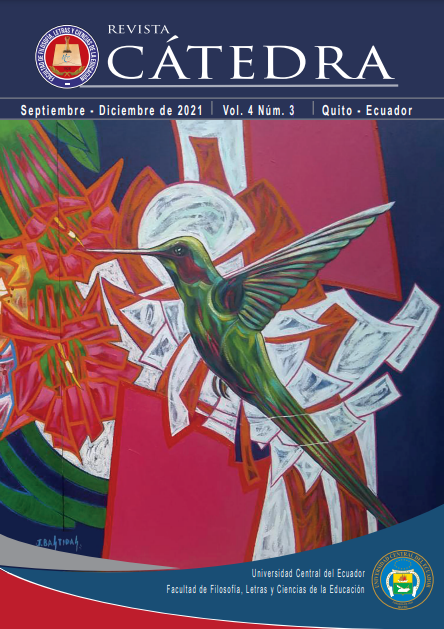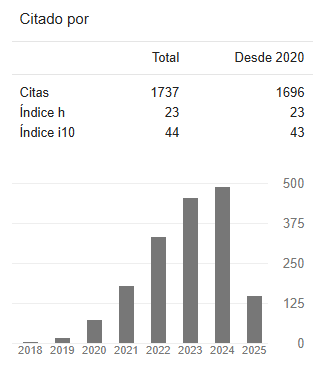Analyzing the transition from face-to-face to remote education: an experience in higher education during the COVID-19 pandemic
DOI:
https://doi.org/10.29166/catedra.v4i3.3173Keywords:
higher education, COVID-19, ICT integration, professional development, self-determination theoryAbstract
ICT integration has become one of the most crucial areas of research in education especially during the COVID-19 pandemic. As research suggests, its integration is highly dependent on the level of competence and willingness of usage, for it is the individual who ultimately decides to integrate ICT into their learning activities. The present study focuses on graduate students and teachers’ experiences of integrating ICT during the COVID-19 pandemic. Understanding the experience of these actors can bring insight into better ways to improve the design and implementation of professional development initiatives focused on ICT integration. In this study, the perceptions from students and teachers were collected through questionnaires and interviews analyzing their experience during the drastic transition from face-to-face sessions to remote learning. Results of this study suggest that, while ICT is accepted as the best possible alternative during the first period of the transition, students and teachers perceive a limited level of competence in instructional design. These results and its implications are discussed in view of guidelines for professional development initiatives.
Downloads
References
Aelterman, N., Vansteenkiste, M., Van den Berghe, L., De Meyer, J., & Haerens, L. (2014). Fostering a Need-Supportive Teaching Style: Intervention Effects on Physical Education Teachers’ Beliefs and Teaching Behaviors. Journal of Sport and Exercise Psychology, 36(6), 595–609. https://doi.org/10.1123/jsep.2013-0229
Ajzen, I. (1991). The theory of planned behavior. Orgnizational Behavior and Human Decision Processes, 50, 179–211. https://doi.org/10.1016/0749-5978(91)90020-T
Cheon, S. H., Reeve, J., Lee, Y., Ntoumanis, N., Gillet, N., Kim, B. R., & Song, Y.-G. (2019). Expanding autonomy psychological need states from two (satisfaction, frustration) to three (dissatisfaction): A classroom-based intervention study. Journal of Educational Psychology, 111(4), 685–702. https://doi.org/10.1037/edu0000306
Cresswell, W. J. (2009). Research Design: Qualitative, Quantitative, and Mixed Methods Approaches. SAGE Publications, 35(2), 260. https://doi.org/10.1017/CBO9781107415324.004
De Rijdt, C., Dochy, F., Bamelis, S., & van der Vleuten, C. (2016). Classification of staff development programmes and effects perceived by teachers. Innovations in Education and Teaching International, 53(2), 179–190. https://doi.org/10.1080/14703297.2014.916543
Farjon, D., Smits, A., & Voogt, J. (2019). Technology integration of pre-service teachers explained by attitudes and beliefs, competency, access, and experience. Computers & Education, 130, 81–93. https://doi.org/https://doi.org/10.1016/j.compedu.2018.11.010
Gegenfurtner, A., Veermans, K., Festner, D., & Gruber, H. (2009). Motivation to Transfer Training: An Integrative Literature Review. Human Resource Development Review, 8(3), 403–423. https://doi.org/10.1177/1534484309335970
Hagenauer, G., Gläser-Zikuda, M., & Moschner, B. (2018). University students’ emotions, life-satisfaction and study commitment: a self-determination theoretical perspective. Journal of Further and Higher Education, 42(6), 808–826. https://doi.org/10.1080/0309877X.2017.1323189
Hattie, J. (2009). Visible learning. A synthetis of over 800 meta-analyses relating to achievement. (Vol. 53, Issue 9). Routledge.
Jaramillo-Baquerizo, C., Valcke, M., & Vanderlinde, R. (2019). Professional development initiatives for university teachers: Variables that influence the transfer of learning to the workplace. Innovations in Education and Teaching International, 56(3), 352–362. https://doi.org/10.1080/14703297.2018.1479283
Jaramillo-Baquerizo, C., Valcke, M., Vanderlinde, R., & Aelterman, N. (2021). Exploring the consideration of university teachers’ basic psychological needs in the design of professional development initiatives. Journal of Higher Education Policy and Management, 43(3), 315–329. https://doi.org/10.1080/1360080X.2020.1812021
Johnson, D. W., Johnson, R. T., & Stanne, M. B. (2000). Cooperative Learning Methods: A Meta-Analysis Methods Of Cooperative Learning: What Can We Prove Works. 1–30.
Kang, H. (2013). The prevention and handling of the missing data. Korean Journal of Anesthesiology, 64(5), 402–406. https://doi.org/10.4097/kjae.2013.64.5.402
Koehler, M. J., Mishra, P., & Cain, W. (2013). What is Technological Pedagogical Content Knowledge (TPACK)? Journal of Education, 193(3), 13–19. https://doi.org/10.1177/002205741319300303
Reeve, J. (2009). Why Teachers Adopt a Controlling Motivating Style Toward Students and How They Can Become More Autonomy Supportive. Educational Psychologist, 44(3), 159–175. https://doi.org/10.1080/00461520903028990
Ryan, R. M., & Deci, E. L. (2000). Self-determination theory and the facilitation of intrinsic motivation, social development, and well-being. American Psychologist, 55(1), 68–78. https://doi.org/10.1037/0003-066X.55.1.68
Schepers, J., & Wetzels, M. (2007). A meta-analysis of the technology acceptance model: Investigating subjective norm and moderation effects. Information and Management, 44(1), 90–103. https://doi.org/10.1016/j.im.2006.10.007
Scherer, R., Siddiq, F., & Tondeur, J. (2019). The technology acceptance model (TAM): A meta-analytic structural equation modeling approach to explaining teachers’ adoption of digital technology in education. Computers and Education, 128, 13–35. https://doi.org/10.1016/j.compedu.2018.09.009
Straub, E. T. (2009). Understanding technology adoption: Theory and future directions for informal learning. Review of Educational Research, 79(2), 625–649. https://doi.org/10.3102/0034654308325896
Su, Y. L., & Reeve, J. (2011). A Meta-analysis of the Effectiveness of Intervention Programs Designed to Support Autonomy. Educational Psychology Review, 23(1), 159–188. https://doi.org/10.1007/s10648-010-9142-7
Tondeur, J., Forkosh-Baruch, A., Prestridge, S., Albion, P., & Edirisinghe, S. (2016). Responding to Challenges in Teacher Professional Development for ICT Integration in Responding to Challenges in Teacher Professional Development for ICT Integration in Education. Journal of Educational Technology & Society Educational Technology & Society, 19(193), 110–120. http://www.jstor.org/stable/jeductechsoci.19.3.110%5Cnhttp://www.jstor.org/stable/jeductechsoci.19.3.%5Cnhttp://about.jstor.org/terms
Downloads
Published
Versions
- 2021-10-22 (2)
- 2021-09-28 (1)









